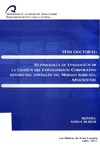Identificador persistente para citar o vincular este elemento:
https://accedacris.ulpgc.es/jspui/handle/10553/7184
| Campo DC | Valor | idioma |
|---|---|---|
| dc.contributor.advisor | Rubio Royo, Enrique | - |
| dc.contributor.advisor | Ocón Carreras, Antonio Andrés | - |
| dc.contributor.author | Skareb, Asmaa | - |
| dc.date.accessioned | 2012-03-28T04:00:39Z | |
| dc.date.accessioned | 2018-06-05T11:22:37Z | - |
| dc.date.available | 2012-03-28T04:00:39Z | |
| dc.date.available | 2018-06-05T11:22:37Z | - |
| dc.date.issued | 2011 | en_US |
| dc.identifier.uri | https://accedacris.ulpgc.es/handle/10553/7184 | |
| dc.description | Programa de doctorado: Tecnologías de la Información y sus Aplicaciones | en_US |
| dc.description.abstract | The current context of the new economy of knowledge is characterized by the emergence of new produced models based on intangible capitals as an integral part of organizational chain value and main source of sustainable competitive advantage. Knowledge is no longer used as a medium to become an active key for enabling organizations to gain a competitive advantage and to improve their profitability. However, knowledge management and exploration of its potential is not easy. Its intangible and complex aspect makes its management more difficult. For the present work, we attempt to solve this problem by proposing a methodology of evaluation of the Corporate Knowledge Management (Top-Down) from the perspective of SURICATA1 Model. Our work identifies three main components that affect the implementation and deploy strategies based on knowledge management, and develop a methodology based on indicators and metrics for evaluation. The three components of our methodology are: Evaluation of Organizational Culture, Social Capital Evaluation and Evaluation of Organizational Processes. To achieve that, we used the operational audit, audit information, the methodology pKM2 SURICATA and explored the potential of social network analysis to evaluate the elements of knowledge management. | es |
| dc.format | application/pdf | es |
| dc.language | spa | en_US |
| dc.rights | by-nc-nd | es |
| dc.subject | 33 Ciencias tecnológicas | es |
| dc.subject.other | Gestión del conocimiento | es |
| dc.subject.other | Redes sociales | es |
| dc.title | Metodología de evaluación de la gestión del conocimiento corporativo dentro del contexto del Modelo Suricata : aplicaciones | en_US |
| dc.type | info:eu-repo/semantics/doctoralThesis | en_US |
| dc.type | Thesis | en_US |
| dc.type | Thesis | en_US |
| dc.type | Thesis | en_US |
| dc.compliance.driver | 1 | es |
| dc.contributor.departamento | Departamento de Informática y Sistemas | en_US |
| dc.contributor.facultad | Escuela de Ingeniería Informática | en_US |
| dc.identifier.absysnet | 658623 | es |
| dc.investigacion | Ingeniería y Arquitectura | es |
| dc.rights.accessrights | info:eu-repo/semantics/openAccess | es |
| dc.type2 | Tesis doctoral | en_US |
| dc.identifier.matricula | TESIS-698570 | es |
| dc.identifier.ulpgc | Sí | es |
| dc.contributor.programa | Tecnologías De La Información Y Sus Aplicaciones | es |
| item.fulltext | Con texto completo | - |
| item.grantfulltext | open | - |
| crisitem.author.dept | GIR IUIBS: Tecnología Médica y Audiovisual | - |
| crisitem.author.dept | IU de Investigaciones Biomédicas y Sanitarias | - |
| crisitem.author.parentorg | IU de Investigaciones Biomédicas y Sanitarias | - |
| crisitem.author.fullName | Skareb,Asmaa | - |
| crisitem.advisor.dept | GIR IUCTC: Centro de Innovación para la Sociedad de la Información | - |
| crisitem.advisor.dept | IU de Cibernética, Empresa y Sociedad | - |
| crisitem.advisor.dept | Departamento de Informática y Sistemas | - |
| Colección: | Tesis doctoral | |
Visitas
79
actualizado el 10-ene-2026
Descargas
866
actualizado el 10-ene-2026
Google ScholarTM
Verifica
Comparte
Exporta metadatos
Los elementos en ULPGC accedaCRIS están protegidos por derechos de autor con todos los derechos reservados, a menos que se indique lo contrario.
